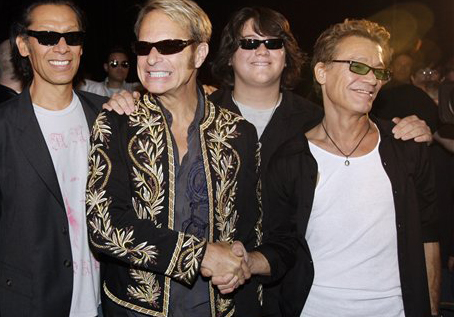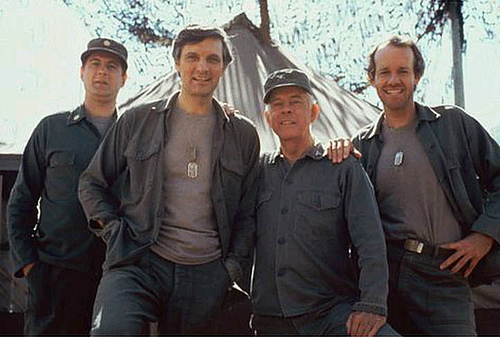
The point of a column like this is not to be a consumer guide, or to give “thumbs up”/”thumbs down” to the latest media product (which is just as well since Ebert owns the whole thumbs-up thing and could sue the pants off me for copping his gimmick). I’m trying to engage some of the ideas underpinning popular culture — notions of authenticity, influence, presentation, expectation — and kick them around to see how they fall. I’m trying, in short, to start a conversation.
And sometimes I’m trying to start an argument. It falls to the critic sometimes to assume a contrarian stance, either by default or by design. The aim is not simply to be disagreeable, not to reflexively oppose received wisdom, but to take nothing for granted. By taking an opinion that “everybody knows” is wrong, you put your interlocutor in the position of defending the view that “everybody knows” is right, and examining why it’s right. And that’s how you get at deeper truths.
And so, in the spirit of the pursuit of knowledge (and also in the pursuit of pissing people off, why isn’t particularly helpful but which can be a whole lotta fun), here are my fightstarters — a selection of my contrarian, heretical, or just plan Wrong ideas about pop culture. You may disagree: in fact, that’s kind of the point.
 Sonic Youth: most overrated band ever. I don’t want to fall into the reactionary stance that “That’s not music, it’s just noise,” but, well, y’know. SY are primarily interesting in theory, rather than practice, and even then not really. They’re nowhere near as smart as they’d like to believe (has Thurston Moore ever made a public statement that wasn’t cringe-worthy?) and the noise is treated as an end in itself. Which would be okay, if were interesting noise; but it comes off kind of half-assed, like they’re aiming for the hypnotic repetitiousness of krautrock but can’t quite get their time together, or for the shifting soundscapes of free jazz but they haven’t got the steady flow of ideas that keeps it from slipping into tedium and saminess. So it falls between two stools. Sonic Youth are like the Ramones in that they’ve been doing this for what, almost thirty years now? without getting any noticeably better. That’s not an argument for quality.
Sonic Youth: most overrated band ever. I don’t want to fall into the reactionary stance that “That’s not music, it’s just noise,” but, well, y’know. SY are primarily interesting in theory, rather than practice, and even then not really. They’re nowhere near as smart as they’d like to believe (has Thurston Moore ever made a public statement that wasn’t cringe-worthy?) and the noise is treated as an end in itself. Which would be okay, if were interesting noise; but it comes off kind of half-assed, like they’re aiming for the hypnotic repetitiousness of krautrock but can’t quite get their time together, or for the shifting soundscapes of free jazz but they haven’t got the steady flow of ideas that keeps it from slipping into tedium and saminess. So it falls between two stools. Sonic Youth are like the Ramones in that they’ve been doing this for what, almost thirty years now? without getting any noticeably better. That’s not an argument for quality.
Seinfeld hasn’t aged well. I remember watching it faithfully all through the ’90s and laughing uproariously. But now when I catch a rerun, nothing. Not even a smile. Same thing with The X-Files — it’s hard to remember what all the fuss was about. Very much of its time, I think.
It’s ridiculous for Major League Baseball to play by two sets of rules. Indeed, were I Commissioner of Baseball (assuming that position were ever again to have any real independent authority, which is a whole ‘nother topic) I would move to standardize the game. And even though my beloved Red Sox are an AL team, I would standardize to National League rules; big home runs from the Designated Hitter may put asses in seats, but NL rules better capture the essence of the sport, I think, with the emphasis on being an all-around athlete.

Eddie Van Halen is in no way a great guitarist, let alone the Greatest Ever. Oh, he’s got chops and flash, and he is without a doubt the best guitarist for Van Halen — but that’s part of the problem. His comfort zone is ridiculously small, and outside it — on a slow blues, say, or a ballad — he’s pretty useless. His entire compositional genius has gone towards, essentially, creating a cozy straitjacket for himself. He’s essentially a genre unto himself, and only functional within that genre. Does that make him the best of the best? No. It makes him the World’s Strongest Cripple. At this point, he’s not even the best Eddie Van Halen-style guitarist out there; there are others who can cop his tics and apply them with more range and imagination than he ever did.
NASCAR is not a sport. It doesn’t exist on an amateur level, so there’s nothing aspirational about it, nothing of sportsmanship or athleticism or play. The primary thrill of car racing is its transgressive nature: the whole enterprise is about getting away with actions that, outside the confines of the racecourse, would get you arrested. I’ll accept NASCAR as a sport the day that some promising young driver goes to college on a stock-car racing scholarship.
Although it is a cultural moment that comes in for much mockery, the 1980s were, in fact, an excellent decade for music. Don’t look at the clothes, don’t watch the videos — just listen. So much craft, so many hooks. And Simple Minds’ Sparkle in the Rain stands up head-to-head against just about any other album you’d care to name.
The “sport” of boxing has no place in a civilized society. Related: the most important difference between horse racing and dogfighting is that race horses are bred and kept by rich white people.
M*A*S*H was probably the best American sitcom ever.

The myth of the holy innocent, of the purity of the primitive, is so much sanctimonious bullshit, invoked to justify the continued exploitation and mockery of the mentally ill and the socially maladapted.
I would rather watch one of Wim Wenders‘s batshit-crazy artistic failures (i.e. everything after Wings of Desire) than an artistic success by nearly anyone else. Exception: his music-related documentaries (Buena Vista Social Club, his segment of Martin Scorsese’s series on the blues), which come off as tone-deaf, patronizing, and borderline racist.
Whatever you may think about Sting’s solo career, the Police were probably the best band of the last 30 years.
The hold that football has on the American public is unconscionably disproportionate. Given the length of the season and the overall quality of play, the relative popularity of football vs. baseball leaves me baffled and kind of sad. Baseball players work harder, for longer, and more often. All athletes are ridiculously overpaid, of course, but baseball players come closest to earning that salary. Come on, football; one day a week, for like twelve weeks, and that’s it? Where’s the work ethic?
In terms of melody, mood, sophistication, and daring, the “dance” music of the last half decade or so beats the pants off the “rock” music of the same era; there’s more sheer tunefulness going on in any random track by Lindstrøm than in an entire album by, say, Okkervill River or the Fiery Furnaces.
The most underrated virtue in music, among fans and critics alike, is professionalism. I was watching a documentary on the legacy of the Monterey Pop Festival, and the point was made over and over how all the white rock kids were so blown away by Otis Redding. “We’d never seen anything like this,” was the refrain. To which I thought: Well, duh. Otis was simply doing his job. He was an entertainer: he entertained. You blow an audience away by showing up and putting in an effort to connect. And after the narcoleptic self-indulgence of the San Francisco bands, whirling about the stage in their own private ecstasies in which the audience was grudgingly allowed to participate, this was some kind of blinding revelation. Fuck inspiration; that stuff is cheap. Doing The Work, man — that’s where it’s at.
[kml_flashembed movie="http://www.youtube.com/v/IZxNZ-hikto" width="425" height="344" allowfullscreen="true" fvars="fs=1" /]
The continuing influence of Simon & Garfunkel is much more pervasive than anyone these days cares to admit.
 Andrei Tarkovsky’s Stalker comes perilously close to fulfilling every braindead reactionary stereotype about insufferable European art movies. I mean, I know it’s the work of a certified genius — but I think that if I hadn’t known that going in, I would’ve hated it. And I generally like long, slow movies. I found Andrei Rublev utterly absorbing, and Solaris had a grim fascination, but Stalker — man. By the end, I could hear Johnny Rotten’s voice in my head: “Ever get the feeling you’ve been cheated?”
Andrei Tarkovsky’s Stalker comes perilously close to fulfilling every braindead reactionary stereotype about insufferable European art movies. I mean, I know it’s the work of a certified genius — but I think that if I hadn’t known that going in, I would’ve hated it. And I generally like long, slow movies. I found Andrei Rublev utterly absorbing, and Solaris had a grim fascination, but Stalker — man. By the end, I could hear Johnny Rotten’s voice in my head: “Ever get the feeling you’ve been cheated?”
As I have theorized elsewhere, the template for the electropop duo traces back not to Suicide, as is commonly claimed, but to Captain & Tennille.
Tim Burton is a terrible filmmaker and a horrible person — an idea-free hack, and in fact hostile to great ideas. His recent string of remakes and “reimaginings” represent an attempt to retroactively obliterate the great art of the past by dragging it down to his level. His films are proof that he hates humanity and wishes to destroy us, and they will be used as evidence when he is, inevitably, put on trial in The Hague.
Man, it felt good to let that all out. Now, DUKES!




Comments